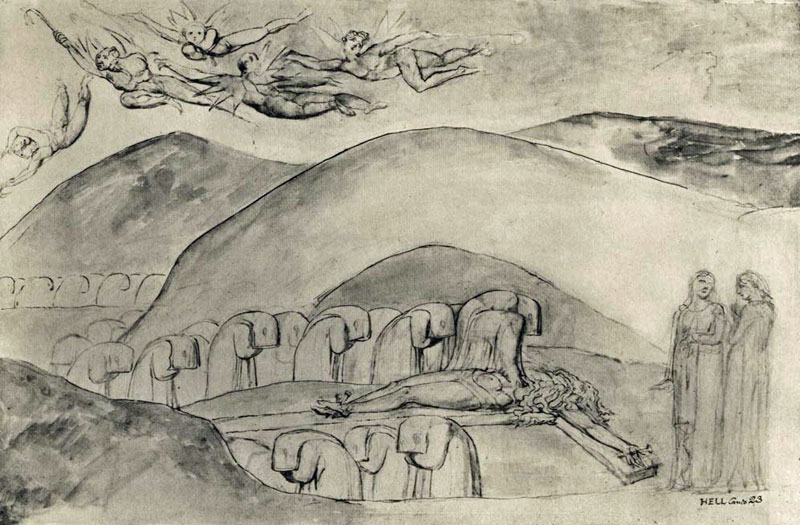Dante and Virgil, on the right, watch the hypocrites, wearing lead-lined cloaks, filing past the high priest Caiaphas, who is nailed to a cross on the ground. Caiaphas was the priest who said that Christ should die. Each hypocrite steps on Caiaphas as he passes.
The “just man” has been turned away from the institutions of church and state, and in his place are fools and hypocrites who preach law and order but create chaos.
William Blake, The Marriage of Heaven and Hell
Book of Jubilees (4.5) :
“He that sees but does not bear witness, be accursed.”
According to Merriam-Webster, a hypocrite is “a person who puts on a false appearance of virtue or religion” or “a person who acts in contradiction to his or her stated beliefs or feelings.” Or, “the behavior of people who do things that they tell other people not to do : behavior that does not agree with what someone claims to believe or feel. Or, “the quality of acting in a way that goes against claimed beliefs or feelings.
The American Heritage Dictionary defines hypocrisy as “The practice of professing beliefs, feelings, or virtues that one does not hold or possess; falseness.” The British literary critic William Hazlitt agrees and writes: “He is a hypocrite who professes what he does not believe; not he who does not practice all he wishes or approves.”
One definition emphasizes inconsistent behavior while the other focuses on falseness or professing what one does not believe. Using the first, a clergyman guilty of fornication is a hypocrite, but using the second he is not a hypocrite as long as he believes fornication is a sin. He is simply a flawed human being.

Sea Gull Cellar Bar Napkin Art, Roy Hoggard artist
The difficulty of coming to agreement about the meaning of the word hypocrite arises from its origin. This, however, is also in some dispute. In “Are We All Hypocrites?” philosopher Susi Ferrarello writes:
Hypocrites were simply actors who on stage had to pick the right words and right tones to give shape to a writer’s fantasy.
The word hypocrite, from the neutral amalgam of the prefix hypo-, meaning “under”, and the verb krinein, meaning “to sift or decide”, pointed to the ability to sift through or decide upon the right words to use. Their decision came from ‘under’ because their voice was amplified by a disposable ask of linen or cork that they used for the interpretation of many different characters in the theatre.
But there are other interpretations:
No…it has nothing to do with interpreting stories from underneath masks. The root words are hypo (or ypo) and crit. Hypo means under, as in under utilized. And crit means to analyze or interpret. Like critique. So hypocrite means one who is under-critical, falsely representative or subversively interpretive. All three meanings can apply, and as the original usage seems to suggest, the original connotation was closer to the middle or latter and has evolved with time to the former.

Sea Gull Cellar Bar Napkin Art, artist unknown
We could go round and round with this. It suffices here to define hypocrisy in the same way that Justice Potter Stewart defined pornography: “I shall not today attempt further to define the kinds of material I understand to be embraced within that shorthand description [hard-core pornography]; and perhaps I could never succeed in intelligibly doing so. But I know it when I see it.
“I’m not a big fan of hypocrisy,” House Minority Whip Steny H. Hoyer said. “When you criticize the Obama administration for doing something, Trump does exactly the same thing and you don’t criticize it, it is hypocrisy.”
17th century clergyman, Obadiah Sedgwick, identified three sorts of hypocrisy in his sermon The Anatomy of Secret Sins (Chapter 1, pp. 20-21):
Natural. This hypocrisy has footing in every man. “Even the most upright heart has in it some hypocrisy, and he sometimes seems to be that which he is not; he may be sometimes more full in his profession than he is indeed in his actions”.
Foul and Gross. This is when a man’s heart is not at all what it seems to be to the world. These are as the Pharisees of old, of whom Christ compared to white-washed tombs. “This is when a man shall profess he loves God and Christ and His ways, and yet secretly condemns and hates holiness and resists the motions of God’s Spirit, and is at defiance with all the heavenly rules of life and powerful obedience.”
Formal. This hypocrisy is when a man not only deceives others but deceives his own heart as well. Such a pride may come in part from a man confusing grace in performance with grace in character. He is even afforded a bit of happiness but at the same time he holds “some sweet morsel under his tongue with which he will not part”.

Sea Gull Cellar Bar Napkin Art, artist unknown
“Natural” hypocrisy is not my concern. The English essayist Max Beerbohm says in The Happy Hypocrite: “I hold that candour is good only when it reveals good actions or good sentiments, and that when it reveals evil, itself is evil.” I tend to agree. “Foul and gross” hypocrisy is clearly a menace to society It must be confronted and rejected. “Formal” hypocrisy holds out the hope but not the promise that the hypocrite might be brought to the truth and redeemed.
Politics changed the meaning of hypocrisy. (Ferrarello)
The word “hypocrisy” began to hold a negative meaning in the 4th century B.C., when hypocrisy met politics. I will spare you any comment on this, it is too easy! The great orator Demosthenes ridiculed his rival Aeschines because he had been a successful actor and politician. You can imagine Aeschines as the Ronald Reagan of the 4th century. His career as an actor and a politician made him the perfect hypocrite, impersonating characters on the stage and delivering political speeches to his audience
Hypocrisy combined with politics can be a great danger. Unlike the harmless stage actors discussed by Ferrarello who used hypocrisy as a tool to “interpret their thoughts in a diplomatic way,” the hypocrisy of an unscrupulous politician can lead in the worst case to the total breakdown of democracy and even to tyranny.

Sea Gull Cellar Bar Napkin Art, artist unknown
We have a President today who is a pathological liar. It’s even worse than that. Not only does he disrespect the truth, he actually doesn’t care whether what he says is true or false. Like the Sophists of ancient Greece who were hired by politicians to say what it takes to carry the day, he is a modern day sophist who will say or do anything to win. Winning is the only measure of success. There have been liars in American politics from the beginning but no one has lied as often or as openly as Donald Trump. He flouts the law and ignores the evidence in ruthless pursuit of victory and power. He brands entire groups of people falsely—Mexicans, Muslims, women, the poor—while boasting that he is their one true friend, a cruel deception.
Oscar Wilde: Ordinary cruelty is simply stupidity. It is the entire want of imagination.
Such branding of races, religions, sexes and classes is not unique with Trump, but he takes it to a new and higher level. We are all guilty as Jon Stewart reminds us in the Washington Times: Jon Stewart Slams Liberal Hypocrisy for Branding Trump Voters Racist. We should remind ourselves that “the same country that elected Donald Trump elected Barack Obama.” But then, we should do something. Donald Trump, not those who voted for him, should be held accountable for his personal failings.

Sea Gull Cellar Bar Napkin Art, James Maxwell artist
Speechwriter and political columnist Michael Gerson argues that hypocrisy is the lesser of two evils with Trump in a Washington Post article Hypocrisy is Good for America.
This is a rare ethical circumstance in which realism and good sense take the form of hypocrisy. On a variety of issues, the sincerity of Trump’s current intentions – or the cynicism of his past intentions – should not matter. If the candidate who gave a wink and nod toward white nationalism now repudiates the alt-right and promises to “bring this country together,” so much the better. If the candidate who promised a trade war with China reconsiders, it is all to the good.
I have heard it said that a sense of realism will change the President as the campaign morphs into the actual job of the Presidency. To be fair, we have seen some of this but his words never change. Does this mean that “sincerity” and “cynicism” don’t matter because it’s better to have a hypocritical President with better policies than to have an honest President with disastrous policies? Why should we have to have either? Shouldn’t we expect more from a leader? It’s true that all politicians lie or stretch the truth during the campaign. For Donald Trump, however, the campaign never stops.

Sea Gull Cellar Bar Napkin Art, artist unknown
Inconsistency is a political tactic. Consistency is a political liability, or can be. Barry Goldwater’s most famous line in the 1964 election was “Extremism in defense of liberty is no vice, and moderation in defense of justice is no virtue.” I admire his pluck but being so explicitly truthful cost him the election. People rightly fear extremism because it leads to fanaticism. What if your understanding of “liberty” or “justice” is wrong? Nobel physicist Richard Feynman explained where false belief can lead in his book on The Meaning of Life:
In fact, it is from the history of the enormous monstrosities created by false belief that philosophers have realized the apparently infinite and wondrous capacities of human beings. The dream is to find the open channel.
The open channel denotes a willingness to listen carefully to the other side and to admit, when confronted with sufficient evidence, that you may be wrong. It is not true that any commitment is better than none. It is not acceptable to pit commitment against reason. Fanaticism is the downside of unquestioned faith, and too often fanaticism leads to atrocities.
On the other hand, standing on principle is to be admired when not carried to the extreme. By the 1980s, the increasing influence of the Christian right on the Republican Party so conflicted with Goldwater’s libertarian views that he became a vocal opponent of the religious right on issues such as abortion, gay rights, and the role of religion in public life. He narrowly won re-election to the U.S. Senate in 1980. He did not run again. He was replaced by John McCain, another principled man. Neither Goldwater nor McCain could be called a hypocrite and both paid a price for their honesty.
John McCain has moral integrity and courage. He drew a line when he ran against Barack Obama. John McCain’s greatest moment in the campaign was when he defended Obama’s fundamental patriotism and decency. You can watch the him HERE.
Many on the right today—Christians, libertarians, mainstream Republicans—certainly understand that President Trump does not share their beliefs. Some even see him as delusional or worse. Their hope is that he will implement their policies. To justify their support for a man who is contrary to their values but expedient, hypocrites use a common theological process called exegesis—picking and choosing from evidence on one side while ignoring evidence on the other. Philosopher Walter Kaufman describes the process of exegesis in The Faith of a Heretic:
To use a political term: almost everybody gerrymanders, carving an idealized self-portrait from the Gospels and much less attractive straw men from the literatures of other faiths. A great deal of theology is like a jigsaw puzzle: the verses of the Scripture are the pieces, and the finished picture is prescribed by each denomination, with a certain latitude allowed. What makes the game so pointless is that not all pieces have to be used, and any piece that does not fit may be reshaped, provided one says first, “this means.” That is called exegesis … Interpretation is inevitable but exegetical thinking is not. The exegetical thinker endows his text with authority, reads his ideas into it, and then gets them back endowed with authority.
Donald Trump himself uses exegesis constantly, but he throws out the pieces of the puzzle and makes up his own pieces when it suits him. Think “fake news” and “alternative facts”.
Expediency justifies hypocrisy for those who believe the ends justify the means. Consider the recent discussions regarding torture and refugees. John McCain refuses to take the easy road. He draws his line on principle. Leaders who follow instead of leading take the easy way out. Emma Green says in Where Christian Leaders Stand on Trump’s Refugee Policy:
If so many prominent Christian leaders reject the notion that their fellow Christians should get preferential treatment, why has this become Trump’s policy? One possible answer is that these leaders don’t necessarily reflect what their flocks believe. Even if they think an open refugee policy is in line with the teachings of Christianity, lay Americans don’t necessarily feel the same way.

Sea Gull Cellar Bar Napkin Art, Efrom artist
Faustian deals on both sides of the aisle are rife in Washington. Everyone knows this. Consider Paul Ryan’s Craven Pact With Donald Trump by John Cassidy in The New Yorker or Barney Frank’s argument that hypocrisy and flip-flopping are essential to the functioning of Congress in The Political Virtues of Hypocrisy. Healthy give and take is a good thing but that can’t happen if the polarization between the two sides becomes so extreme that it destroys greater values. As the Guardian points out:
… already some of the most bitter critics of Trump during the campaign have decided to throw their lot in with him, because ultimately, they hate the left even more.
A favorite phrase of parents, religious zealots, and politicians is “Do as I say, not as I do.” According to the Urban Dictionary this is an expression used to call out hypocrites, including “environmentalists” with private jets, politicians who send their children to private schools while opposing measures to give other kids the same chance, or those who accuse others of racism while not hiring minorities.

Sea Gull Cellar Bar Napkin Art, Roy Hoggard artist
Most of us have multiple goals and values and sometimes they conflict. The philosopher Susi Ferrarello says we are all hypocrites because human beings are multi-dimensional and complicated. She writes:
After all, we are always obliged to wear a mask in order to live an intersubjective life …
In contemporary literature “hypocrisy” has become a paradox, portraying sincerity as something that actually comes from one’s ability to be two-faced. Hypocrisy therefore acquired a sense of fluidity, a sort of loyalty to the multiplicity of one’s own psyche …
We seem to be doomed to live as hypocrites (in the best-case scenario) because we are condemned to live as one and wear only one mask at a time, despite the multiplicity that characterizes each moment of our life …
Walt Whitman, being a poet, puts it succinctly:
Do I contradict myself?
Very well then I contradict myself,
(I contain multitudes.) Walt Whitman, Song of Myself
There isn’t any way to entirely avoid hypocrisy in real life. A just and peaceful society depends on hypocrites who ultimately refuse to abandon the ideals they betray. “Yes, I do smoke but smoking is still a bad idea, son.” Laws must be made and laws must be interpreted if society is to work. That means negotiation, give and take. There is no shame in this. There is, however, great responsibility. Each of us must draw our line, the line we will not cross. Donald Trump refuses to draw a line and that, in my opinion, disqualifies him. He is aware of what he’s doing. He even brags about it. That is why his hypocrisy is of the “foul and gross” sort, the worst kind, as categorized by Clergyman Sedgwick.
“Why do I have to repent or ask for forgiveness if I’m not making mistakes,” he said to Anderson Cooper.
Donald Trump is a man guilty of financial hypocrisy, sexual hypocrisy, and racial hypocrisy, an intellectual philanderer with no honesty or integrity and projects something very dangerous: the marriage of tyranny and contempt for the truth. His cruel trick on the American people derives from “a certain kind of political hypocrisy—the conscious use of a mask to fool the public and gain political benefit.” Michael Gerson, in the article quoted, is wrong to put his cards on the possibility of Donald Trump changing, becoming more pragmatic. It is also wrong to assume as many do that Trump’s “handlers” and “enablers” in Congress will control him, rein him in, in some way make the unreasonable reasonable. There is no making the abnormal normal. It is up to us, each one of us to put an end to this charade.

Sea Gull Cellar Bar Napkin Art, Estelle Grunwald artist
I’ll close with a quote form the short story, Hypocrites, by George Saunders
Then something long festering began to rise in me. If these two, who’d been vetted by the system, and who actively, and every day, professed their belief in that system, and lectured us on our failings, could so surreptitiously defy, even insult, the system, didn’t this suggest that the system’s most senior representatives (Monsignor A, for example, venerable, cranky, ordained just after the First World War) might also be merely human, and thereby flawed? Mightn’t the system, supposedly overseen in even its smallest details by God Himself, via these representatives, actually be just a crude, man-made form, inspired by, but inaccurately addressing, even obscuring, some greater and more difficult-to-discern truth? A truth that was still out there, waiting to be discerned? By me?
Yes, it’s just you and Me now, Jesus said inside me. You can know Me all on your own. In fact, that is how you must know Me.
And that’s it. You are on our own. It’s up to you to decide where to draw your line. My line is drawn right through Donald Trump. He is the worst kind of hypocrite and he must be removed from office.
Postscript
I am not a Christian or a member of any church. As I’ve said before, I’m with Tom Paine, my own mind is my own church. One often hears that America is a Christian nation. I have read the Bible. To the Christians in this great country, I wish to remind you of a few passages that I think are relevant to the complexity of hypocrisy in the age of Donald Trump. I hope you will consider them as carefully as I have. And yes, I too am guilty of exegesis.
John 8:7 (KJV)
He that is without sin among you, let him cast a stone
Matthew 5-6 (KJV)
And when thou prayest, thou shalt not be as the hypocrites are: for they love to pray standing in the synagogues and in the corners of the streets, that they may be seen of men. Verily I say unto you, They have their reward. But thou, when thou prayest, enter into thy closet, and when thou hast shut thy door, pray to thy Father which is in secret; and thy Father which seeth in secret shall reward thee openly.
Matthew 26:41
Watch and pray, that ye enter not into temptation: the spirit indeed is willing, but the flesh is weak.
Exodus: 22:21
Do not mistreat or oppress a foreigner, for you were foreigners in Egypt.”
Luke 10:25-37 (in full)—The story of the Good Samaritan
Proverbs 19:17
He that hath pity upon the poor lendeth unto the LORD; and that which he hath given will he pay him again.
Matthew 19:21 and Luke 18
Jesus said unto him, If thou wilt be perfect, go and sell that thou hast, and give to the poor, and thou shalt have treasure in heaven: and come and follow me.
Romans 12:19
Dearly beloved, avenge not yourselves, but rather give place unto wrath: for it is written, Vengeance is mine; I will repay, saith the Lord.
Matthew 23 (in full): The Woes of the Pharisees or A Warning Against Hypocrisy
Micah 6:8: What does the LORD require of you but to do justice, and to love kindness, and to walk humbly with your God?
Book of Jubilees 4.5: “He that sees but does not bear witness, be accursed.”
1 Kings 18:21
And Elijah came unto all the people, and said, How long halt ye between two opinions? If the LORD be God, follow him: but if Baal, then follow him. And the people answered him not a word.


Excellent, KD. Now go and get it published!
I have so much to say to you in appreciation David. I have yet to find my beginning words. So, thanks a heap David. You’ve made my day as I now can pick through more of inner workings than I did yesterday. Good on you. I will read this more than once.
D avid, Even better on second reading.
The last image, the COat of Many Colors, is by Estelle Grunwald.
Again many cheers,
Max
Thanks for the information on Estelle. I always loved her and have a great double painting by her that I have in a corner of the wall with one side a woman, back toward the viewer, admiring flowers and a forest of trees on the other side. Beautiful Estelle.
David thank you for writing and posting this. It brings up so much in me in my futile inclination to simplify things. I see a multitude of ideas elliptically orbiting the gravitational center of truth, with none able to achieve supremacy, but all adding something to the totality of a momentary understanding. Thanks again…
Thanks, Alex. It is a great honor to have people read my posts and especially to take the time to comment. That is especially true with this post. David